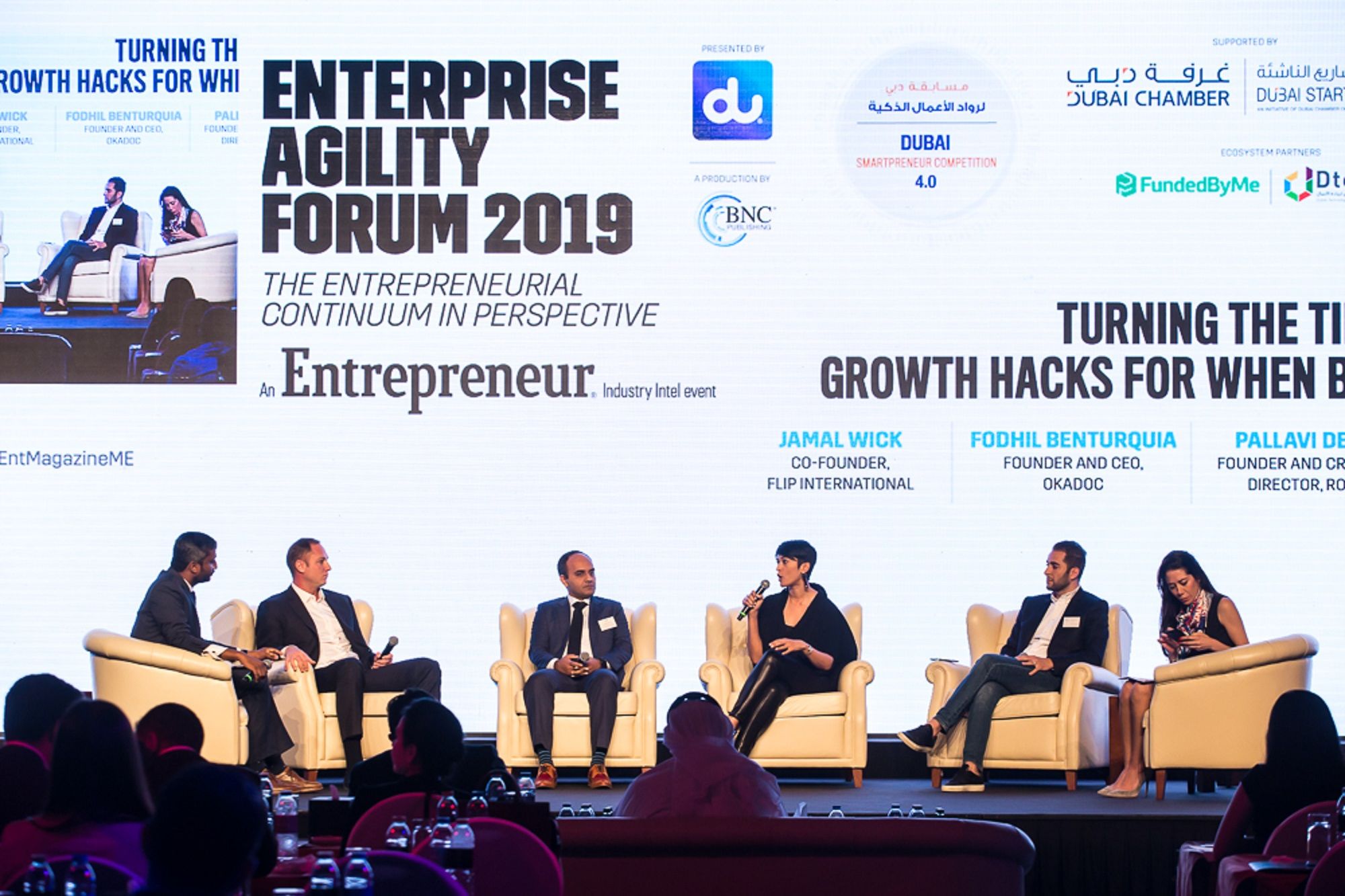Turning The Tide: Growth Hacks For When Business Is Bad Speakers from Flip International, Okadoc, Roar and Sage Middle East shared honest discussions around the darker side of entrepreneurship.
By Megha Merani
Opinions expressed by Entrepreneur contributors are their own.
You're reading Entrepreneur Middle East, an international franchise of Entrepreneur Media.

From dealing with economic downturns, to coping with anxiety when you're going at it alone, the fifth edition of the Enterprise Agility Forum featured brutally honest discussions around the darker side of entrepreneurship.
In a panel discussion, Jamal Wick, co-founder of Flip International, Fodhil Benturquia, founder and CEO of Okadoc, Pallavi Dean, founder and Creative Director of Roar, and Mansoor Sarwar, Director – Technical Services and Pre-Sales, Sage Middle East, shared real life examples and tips for first-time entrepreneurs on how to deal with operating expenses, cost-cutting, and most importantly, their mental health to stay well, focused, and productive even when times get tough.
Here are five things every entrepreneur needs to keep in mind when business is bad:

1. STAY FOCUSED ON THE PROBLEM
It may be a time of sluggish economic growth, or a succession of countless rejections, but be patient, and stay focused on the problem your startup set out to solve, Okadoc's Benturquia advised. Citing his own challenges, the e-commerce entrepreneur shared: "At Okadoc, for example, we are trying to fix a problem that's very important to us, which is just being able to find a doctor and book an instant appointment. Making an appointment takes 5-15 minutes today if a clinic is open. Putting that down to 40 seconds- we felt that it should be a right. [If] you can book your Careem in 40 seconds or less, healthcare is the most important thing, right? So, that felt like a really great problem to solve. But the market is a different reality. You meet clinics and hospitals every day that say, "I don't want people to call, I just want a lead, and I will call them back a few hours later.' You keep facing a no every single day. You keep facing investors that will say 'Oh, this will never work,' or 'the region is different.'"
But all of this naysaying kind of rings a bell for Benturqui. He's seen it happen before through his career with stints at MarkaVIP, Souq, and Noon.com, which is why he believes it's important to simply stay focused on solving problems. After all, the former MarkaVIP cofounder pointed out, nobody believed in e-commerce in 2010 either. "Retailers and distributors were saying, 'Why should I block my products for you to be sold online? I can sell them at my shop.' So, the real challenge is, how determined are you? And how much you believe in it [your idea] and how much you're willing to learn, and make bets, and fail- and just move on with these failures, and be able to really change an entire market."

2. CUT COSTS FROM THE START
Keeping operating costs low early on serves founders well during tough market conditions. And for those who haven't been as cautious, a harsher economic climate provides the ideal scenario to rethink spending and get your books in order. "As a consultancy, it's either famine or feast," said Pallavi Dean, founder and Creative Director of Roar. "So, for us, what we've done is we've kept the fixed costs really low. Yes, we pay a premium for our variable costs. So, if we get a visualizer, or a contractor, or a procurement agent, it's at a higher price. But that means that my bottom line at the end of every month is manageable."
Meanwhile, Flip International's Wick cautions founders not to over-hire. "If you don't hit your revenues, then work on your expenses, and that means look at your operating costs [like] your rent [and] your staff," he advises. "Before you hire a person, think 10 times whether you need to hire that person." In cases where founders branch out with multiple companies, Wick recommended looking for ways to consolidate resources. "Today, I own and operate three companies, but they're all sitting in the same office space, and that allows me to dilute the cost of my rent."
3. INNOVATE AND DIVERSIFY
Rather than remain fixated on a single sector, Roar's Dean advises remaining open to opportunities and diversifying. It's why she calls her company a multidisciplinary practice. "So, say, if the F&B sector is suffering, I know a lot of multinationals are moving in, so that gives us a lot of [other] opportunities," she says.
Sage's Sarwar added that the global online accounting and business services company's recipe for challenging macroeconomic conditions has always been to invest in technology. "Every time there's an economic downturn, it's probably the best time to see what modern technology is around," he noted, adding that automating processes frees companies from expensive human interactions. "A robot's cost is going to be much less than a human's cost."
Related: Aiming High: Opportunity Knocks For The MENA Entrepreneurial Ecosystem

4. GET CLOSER TO YOUR CUSTOMERS
Your customers may be struggling to fend for themselves just as you are, which makes a tough climate the best time to bond with clients to better understand their challenges and needs. "We've found that the easiest economic downturn measure is working with your customers closely, and getting more cross-sell up-sell revenue from them," Sage's Sarwar explains. "Ask them what is bothering them, and as Steve Jobs said, get really close to your customer, and tell them what they need, before they realize it themselves."
Sarwar added that Sage has always strived to be the voice of entrepreneurs and startups across the world, freeing them from the burden of admin, so they can spend more time doing what they love and growing their businesses. For instance, Sage Business Cloud Accounting provides entrepreneurs with powerful tools to stay on top of VAT and compliance regulations, manage all their business interests in one place even while out of the office. "How we helped [startups] in recent years, specifically in the Middle East region, is that we found out that many of our customers who are entrepreneurs are struggling with their cash flow... [and] we were one of the first players who came up with the concept of subscription pricing in the region."
5. ANXIETY IS A GIFT
While there's no shortage of upbeat messaging on following your passion, Roar's Dean told entrepreneurs at the Enterprise Agility Forum that anxiety is a normal part of the journey. "I think one of the big things is we have to stop glorification of entrepreneurship," she stressed. "There's real challenges, real heartache... blood, sweat, tears... but nobody talks about that. It's all about 'find your purpose,' 'go for it,' 'let go of fear'... but it's bloody scary, [so] let's be honest about it." Candid about her own anxiety and panic attacks, Dean wholeheartedly endorses getting help to cope. "I constantly read a lot of self-help books. I see a psychologist, and I have a business coach– and I'm not afraid to admit that openly," she said. However, she admits it is a huge cost.
"But when you run a consultancy, or you are an entrepreneur, you are your business for the first threeto- five years. So, if I don't invest back in myself, then [I'm] not going to progress. We all have our different kinds of issues to deal with and we have to recognize them and get help. I'm just more efficient and productive in the workplace when I'm not thinking about anything else getting in the way."
Insisting that it's normal to experience anxiousness and stress, the interior designer added, "Anxiety is an amazing gift, because anxious people are a prolific bunch. Talk to any entrepreneur, and they are anxious, or any high-achiever and they will also say they have anxiety."
Related: The Next Frontier: The Changing Face Of Entrepreneurship In The Arab World













